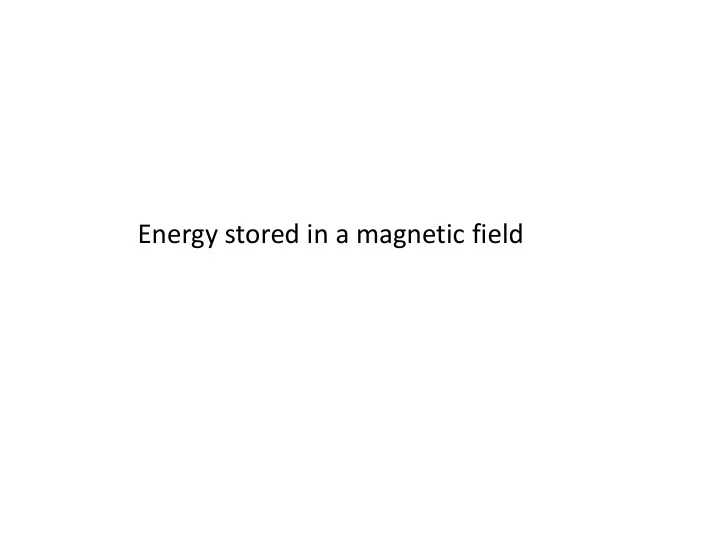

Energy stored in a magnetic field
Energy Stored in an Inductor Energy stored in an inductor: L 1 U 2 LI 2 dI (Do not forget .) - L dt Energy density stored in an electric field: U 1 2 B u B B 2 0
Capacitor and Inductor Capacitor C Inductor L Charge Q Current I E field B field Q V d I - L C d t Parallel plate capacitor (uniform E Solenoid (uniform B field) A V field) 0 L nNA and B nI C and E 0 0 d d 1 1 1 1 2 2 U CV and u E 2 2 U LI and u B E E 0 B B 2 2 2 2 0
Class 40 RL Circuits
From Class 25 RC Circuits – Charging Charge At t=0, capacitance is uncharged and C Q=0 (initial condition). At t=0, switched is closed, if the capacitor has no charge, it behaves like a conductor and I= /R. R After the capacitor is completely charged, Q=C , V C = and V R =0. I=0 and the capacitors behave like an insulator.
RL Circuits – Charging Current At t=0, inductor is uncharged and I=0 L (initial condition). At t=0, switched is closed, if the inductor has no current, it behaves like an insulator (opposes changes) R and I=0. After the inductor is completely charged (with current), I= /R, V L = 0 and V R = . The inductor behaves like a conductor.
From Class 25 RC Circuits – Charging Charge q q d q IR R C C d t C CR dq (C - q) dt dq 1 Integration constant - dt q - C CR t n( q - C ) - K' CR R t - K' q - C Ke CR (K e ) t - q C K e CR At t 0, q 0 0 C K K - C t - CR q C ( 1 e ) t t dq C - - I e CR e CR d t CR R t - V IR e CR R V R + V C = t q - CR V (1 - e ) C C
RL Circuits – Charging Current d I L IR L dI I R dt dt d t L L dI ( - IR)dt L dI Integration constant dt - IR L n( - IR ) t K' R R R R n( - IR ) t K' L L R R - t K' L L - IR Ke (K e ) R - t L IR Ke At t 0, I 0 0 K K R R - t - t L L I R ( 1 e ) I ( 1 e ) R R - t L V IR ( 1 e ) R R dI - t L V R + V C = V L e L dt
RC time constant From Class 25 =RC is known as the RC time constant. It indicates the response time (how fast you can charge up the capacitor) of the RC circuit. t - CR I e R I e 2.72 R - 1 e 0 . 37 - 1 I e R ~ 0 . 37 R t t=RC t - CR q C ( 1 e ) q C 2 1.414 -1 q ( 1 e ) C 1 ~ 0 . 63 C 0 . 707 2 t Nothing to do with RC circuits t=RC
L/R time constant =L/R is known as the time constant. It indicates the response time (how fast you can up a current) of the RC circuit. R d I - t L e d t L dI e 2.72 dt L - 1 e 0 . 37 dI - 1 e dt L ~ 0 . 37 L t t=L/R R - t I ( 1 e L ) R I R - 1 2 1.414 I ( 1 e ) R 1 ~ 0 . 63 0 . 707 R 2 t t=L/R Nothing to do with RL circuits
From Class 25 RC Circuits – Discharging Charge q q d q 0 IR R 0 C C d t CR dq - q dt dq 1 - dt Integration constant q CR t n q - K' C R CR t - K' q Ke CR (K e ) t - CR q K e At t 0, q Q Q K t - CR q Qe t dq Q - CR I e d t RC t Q - CR V IR e R C V R + V C = 0 t q Q - V e CR C C C
Recommend
More recommend